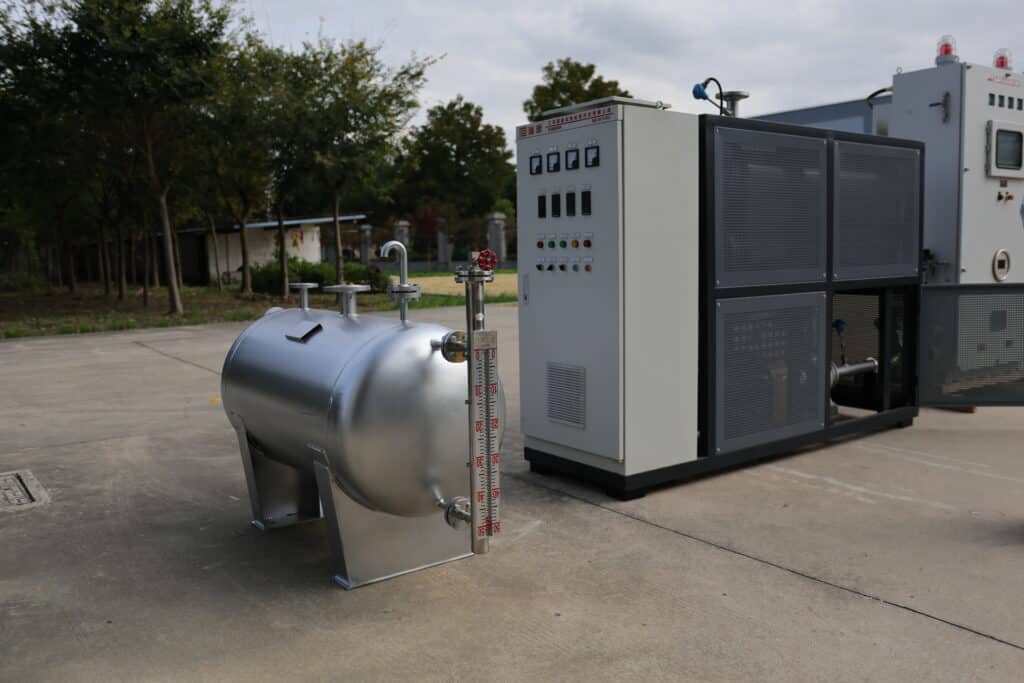Thermal Oil Boiler and conventional boilers (e.g. steam boilers) play an important role in the industrial heating process, but they differ in their operating principles, applications and performance characteristics. Understanding the difference between the two helps companies to choose the right heating equipment according to their actual needs, thus improving productivity, saving energy and ensuring safe operation.
I. Difference in working principle
Thermal Oil Boiler: The Thermal Oil Boiler uses organic heat transfer oil as the heat carrier and circulates the heat in a closed circuit system. It avoids high pressure by transferring heat to the heat transfer oil while maintaining high temperatures. Heat transfer oil usually has a high boiling point and can operate stably at high temperatures, making it suitable for industrial processes that require high temperatures but not steam.
Conventional boilers (steam boilers): Conventional boilers transfer heat through water or steam. The water is heated to steam in the boiler and then transferred through pipes to where the heat source is needed. Steam boilers require high pressure to operate in order to reach the desired high temperature. Due to the low boiling point of water, steam boilers are subjected to higher pressures during the heating process.
Second, the temperature control accuracy and heating effect of the difference between the
Thermal Oil Boiler: Thermal Oil Boiler boilers offer high heating temperatures (typically up to 300°C or more) and are able to operate at low pressures. This gives it a significant advantage in temperature control, especially in processes with stringent temperature requirements, maintaining temperature stability and accuracy.
Conventional boilers (steam boilers): Steam boilers heat at relatively high temperatures and pressures, which may not be accurately controlled in some cases. Especially in cases where the heating demand is unstable or where high precision is required, steam boilers may have certain problems of wasted energy and uneven temperature control.
III. Differences in security and pressure
Thermal Oil Boiler: Thermal Oil Boiler operate at relatively low pressures due to the use of organic heat transfer oil as the heating medium. The boiler is designed to operate at low pressure, which greatly reduces safety hazards and the risk of explosion and leakage. At the same time, the stability and non-volatility of the heat transfer oil makes the equipment safer and more reliable.
Conventional boilers (steam boilers): Steam boilers need to operate at high pressures in order to produce adequate steam temperatures. This high-pressure condition places high demands on the equipment and increases the complexity of equipment maintenance. The high-pressure environment of a steam boiler also means higher safety risks, and improper operation can lead to accidents such as steam leaks or boiler explosions.
IV. Differences in energy efficiency and operating costs
Thermal Oil Boiler: The energy efficiency of theThermal Oil Boiler is higher due to the use of a closed-loop system to circulate the heat transfer oil, which results in lower heat transfer losses. Through precise temperature control, the heating process of the boiler is more efficient, reducing energy waste. At the same time, due to the lower operating pressure of the equipment, maintenance and servicing costs are lower, making it more economical to use in the long term.
Conventional boilers (steam boilers): Steam boilers typically have some heat loss, especially during the heating process, and steam transfer may encounter large heat losses. Steam boilers are relatively expensive to operate because they need to maintain high pressures and temperatures and often require additional maintenance, especially for high pressure steam systems.
V. Differences in scope of application
Thermal Oil Boiler: Organic heat carrier boilers are suitable for industries that require high temperature heating but not steam, especially in the chemical, pharmaceutical, food processing, plastics, rubber and other industries have been widely used. It can provide stable high-temperature heat source to meet various fine process requirements.
Conventional boilers (steam boilers): Steam boilers are more common in industries where heat is required on a large scale, especially in traditional hot water heating, industrial steam supply and boiler-driven machinery and equipment. Steam boilers are suitable for heating processes where there is a demand for steam, such as food steaming, washing and chemical reactions.
VI. Differences in maintenance and longevity
Thermal Oil Boiler: Maintenance of an OTB boiler is relatively simple as its operation does not involve a high pressure steam system. The circulation of heat transfer oil effectively reduces wear and tear on the equipment and, under the right conditions of use, the boiler has a longer service life and longer maintenance intervals.
Conventional boilers (steam boilers): Maintenance of steam boilers is more complex, especially in high-pressure boiler systems, where regular inspections and cleaning are essential. Due to the high pressure and high temperature operating conditions of a steam boiler, its service life may be affected to some extent, requiring more maintenance and overhaul.
Our company can non-standard custom products, click the menu barContact UsReady to customise or refer to firstproduct pageAppreciate our company's products oh!
Recommended Reading:
How to choose the right organic heat carrier boiler? Selection Guide and Notes - Jiangsu Ruiyuan Heating Equipment Technology Co.
